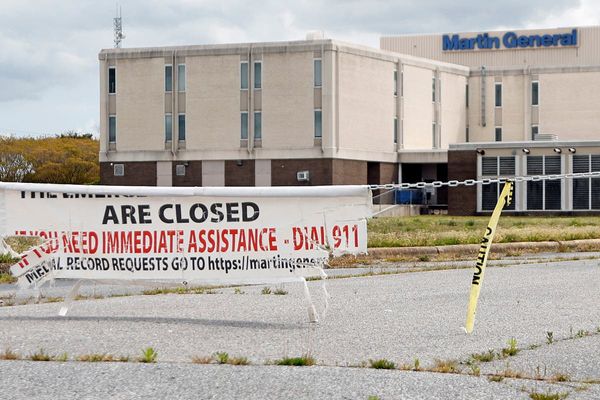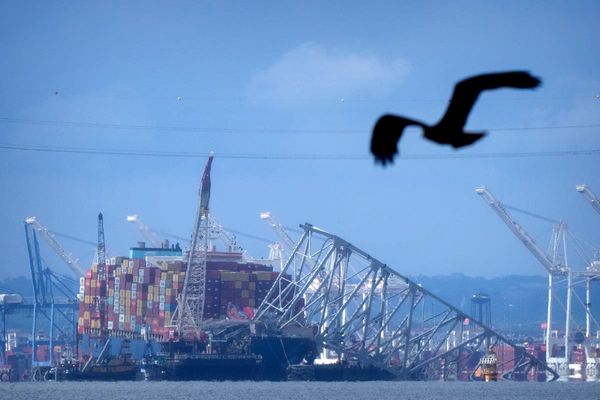
High up in the branches of a tree in Raymond and Cherie Bennett's backyard, a scrap of red and white fabric flaps gently in the breeze.
The couple stare at the piece of torn t-shirt, a relic from a day that was nearly their last.
The Bennetts woke on November 14 after a night of heavy rain to find shallow flood water at the front of their cottage in Eugowra, a village in the heart of central western NSW.
They got dressed and put on toast for breakfast, thinking the worst was over.
But before their morning meal was warm, the water returned with ferocious force, rising over their verandah and quickly engulfing them.
Raymond held his wife - who cannot swim - and they hurried to the backyard.

"She went under three times and by the third time, I said 'if you go under again, I'm too buggered, I can't do it'," he tells AAP, overcome by emotion.
Raymond, who is almost 70, lifted Cherie into the fork of a tree as the water lapped at his neck.
They stayed there, shivering and terrified, for eight hours.
Spiders crawled over Raymond's face as he paddled to stay afloat, while Cherie gripped her handbag in case its contents could help identify them later.
When a rescue helicopter flew nearby in the afternoon, she took off her striped shirt and they used it to flag down help.
A year later, a piece of faded and threadbare fabric still clings to the tree, which is about to blossom behind their spartan emergency pod house.
"It's something you're never going to forget," Cherie says.
"It's just going to be there all the time."
Reminders are everywhere as the community of 800 prepares to mark the first anniversary of the flash flood, which destroyed or damaged 80 per cent the homes in Eugowra and led to 159 rescues.
Two locals who died in the disaster, 60-year-old Diane Smith and 85-year-old Ljubisa "Les" Vugec, are never far from people's minds.
The state government-funded pod houses rise on stilts next to fractured cottages, busted blue stone kerbs reveal eroded earth and the grand old Central Hotel is closed.
Mandagery Creek, which peaked at 11.2 metres after 9am that day, is now a silent, steady stream.
Kim Storey sits on her deck looking out at her property eight kilometres east of town, remembering the day her paddocks became an inland ocean.
Grinning kelpie Ruby bounds around, as Kim quietly recalls the moment she considered jumping off her verandah and into the rapids to escape.
A year has not eased the torment.
"We've got hundreds of people in town who thought they were going to die that day and we lost two," Kim says.
"You get comments sometimes like 'Oh, you had a bit of a flood and Eugowra's all recovered now' but it's not even close."
In the weeks after Kim was plucked to safety by a helicopter, she helped distribute donations to locals who lost everything and saw too much.
"People were stuck on the backs of trucks trying to shield their kids from watching people and animals floating past, or hanging on to a little tree hoping they wouldn't wash away, or stuck up a tree with a baby.
"It's still pretty raw."

Adding to the trauma for many is a lingering feeling state and federal governments have forgotten them.
NSW Premier Chris Minns acknowledged recovery will take some time, having announced $50 million for flood-resilient retrofits and the raising of houses for several central west communities last month.
"We know that recovery is long and can take years and that the trauma of last year is still fresh in people's minds," a NSW government spokeswoman said.
"We will make sure the support that's needed is provided and personalised help is available."
Five days before the anniversary, the federal government matched the state funding.
The financial support is welcome.
But Mr Minns has not come to Eugowra and Prime Minister Anthony Albanese hasn't returned since a visit on November 22, an absence that has been felt in the year-long fight for funding.
"For community recovery, you need hope that support is going to be there," Kim says.
"When you're constantly trying to engage with the people that make decisions about funding and support and you get nothing back, that hope starts to fade quickly."
Fifty metres up the road from the Bennetts, Lesley and Brian Smith have filled their pod house with homely comforts.
Pictures of their curly-haired grandson cover the fridge, a sign next to the front door saying: "Love, laughter and friends always welcome here".

The Smiths moved to Eugowra from the NSW Central Coast 18 months before the disaster, taken by a lemon yellow cottage a short drive from Mrs Smith's sister's place in Molong.
At 9.07am on the day of the flood, Lesley spoke to her sister by phone and reassured her the water was receding.
"At 16 minutes past, I sent her a text message and said, 'Just like that we've lost everything'," she remembers.
The water warped the piers under their house and the force of a rescue helicopter damaged the roof.
It took a year of working with Legal Aid, politicians and eventually the media to get their insurance company to pay them out.
"It's 12 months and we're still not in our house," Brian says with a tired sigh.
"We could have been in our house a long time ago if they'd come to the party and just did their job."
In the aftermath, the Smiths considered leaving Eugowra.
"I said, 'I can't live there, I can't go back'," Lesley says.
"But the more we came out here cleaning up and talking with people, we knew this was it.
"We were meant to be here."

Life-long resident Jack Barnes sits in the men's shed, where little wooden Christmas trees and painted Santa sleighs cover the work benches.
His face drops when he talks about the change he's noticed around town.
"The spark has gone from a lot of people," he says.
"We were thriving, we had members left, right and centre, we'd sit around and we'd tell lies and talk about football and we'd laugh and have cups of tea.
"Since the flood, we've virtually made nothing."
Jack and best mate Ron Hay hope young families will see the attraction of Eugowra in time, when the metallic pods are gone and the town is built back stronger.
"This is the greatest little town you could know of," Ron says.
"What makes great towns is the people who live in communities, but we just need help.
"I don't think we can do it on our own."







